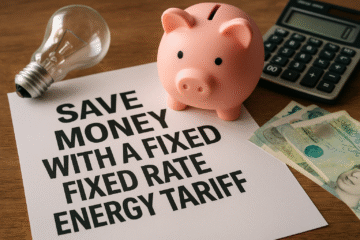Good news for UK households as the energy price cap falls significantly for the period between July and September 2023. The cap, which limits the annual cost of energy for consumers, has been lowered to an average of £2,074, a substantial decrease from the £3,280 level set for March-June. This development translates into a reduction in average bills by £426 a year, offering some relief from the financial strain caused by the recent surge in gas and electricity costs1.
The lowering of the energy price cap comes at a time when the cost of living crisis has been a pressing concern. However, there seems to be a light at the end of the tunnel. Industry regulator Ofgem announced the new cap amidst a backdrop of falling wholesale energy prices, a positive sign for consumers and energy suppliers alike1, meaning getting a better deal is now possible.
Last year saw a spike in energy prices following Russia's invasion of Ukraine. The global political unrest led to an increase in oil and natural gas costs, which was further exacerbated by the imposition of sanctions on the Kremlin by Western governments. Despite these challenges, the energy sector is showing signs of recovery, with a marked decrease in energy prices1.
Tax Payer Support
The UK government's Energy Price Guarantee (EPG), which limits the amount suppliers can charge per unit of energy used, has been in effect throughout the autumn and winter months, keeping bills at around an average annual level of £2,500. However, it's worth noting that this guarantee is set to expire on 1 July, with no further taxpayer support on the table from July onwards. From that point, the energy price cap, reviewed every three months, will resume its role in controlling energy prices1.
While the recent developments are indeed encouraging, the outlook for energy bills remains somewhat uncertain. Current projections predict a stable outlook for energy bills at around the £2,000 level, but these figures are still more than £1,000 above the pre-pandemic average. Moreover, the potential for further shocks in the wholesale market could impact these projections1.
As winter approaches, gas supplies remain a significant concern for future prices. Day-ahead wholesale costs, which peaked at an industry measure of 570p per therm last August, are currently at 66p. However, longer-term contracts are more expensive, reflecting the likelihood of increased demand as winter nears1.
The Future Of The Energy Price
Predicting future energy prices is an inherently uncertain task, as Ofgem's chief executive Jonathan Brearley emphasized during a recent Public Accounts Committee meeting. While he hopes prices will continue to fall, he cautioned that global events could easily cause a rise in energy prices1.
The ongoing cost of living crisis, coupled with rising core inflation, continues to put pressure on households and the economy at large. Economists suggest that this pressure may prompt the Bank of England to continue its cycle of interest rate hikes to dampen demand and therefore prices in the economy over the long term1.
In these turbulent times, it's more important than ever to stay informed about energy prices and potential cost-saving opportunities. Here at Energy Rate Radar, we are committed to keeping you updated with the latest energy news and trends. Stay tuned for more updates and insights!
So now is the time to find a better deal as competition returns to the market and expert money advisors are telling people to start looking for better deals so your not paying to much for your energy.






